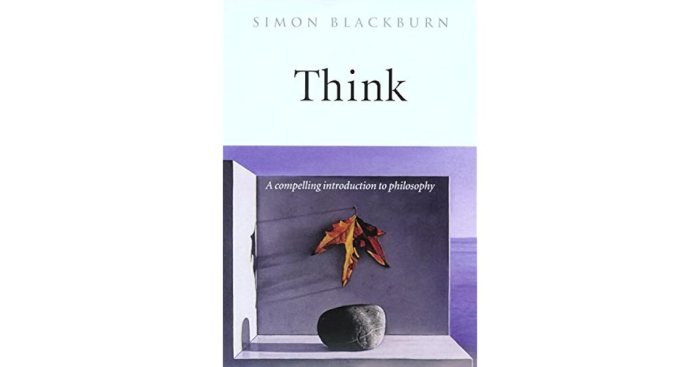Think by simon blackburn pdf – In his seminal work, Think, renowned philosopher Simon Blackburn presents a profound and engaging examination of the nature, epistemology, ethics, and future of thought. With its thought-provoking insights and accessible style, this book promises an enriching intellectual journey for readers seeking a deeper understanding of this fundamental human capacity.
Blackburn’s comprehensive analysis delves into the various forms of thought, exploring its relationship with language and the implications of his theory of “propositional attitudes” for our understanding of cognition. He further examines the ways we acquire knowledge about our own thoughts, addressing the problem of skepticism and the role of introspection.
Simon Blackburn’s Think: An Introduction

Simon Blackburn’s “Think” is an accessible and thought-provoking introduction to philosophy. Blackburn argues that philosophy is not just an academic discipline but a way of thinking that can help us to live better lives. He explores a wide range of philosophical topics, including knowledge, reality, ethics, and the meaning of life.
Blackburn is a distinguished philosopher who has written extensively on ethics, metaphysics, and the history of philosophy. He is known for his clear and engaging writing style, and his ability to make complex philosophical ideas accessible to a general audience.
Structure and Organization
The book is divided into four parts:
- The first part, “What is Philosophy?”, introduces the basic concepts of philosophy and explores the different ways that philosophers have tried to answer the big questions about life.
- The second part, “Knowledge and Reality”, examines the nature of knowledge and the relationship between our minds and the world.
- The third part, “Ethics and the Meaning of Life”, explores the ethical dimensions of human life and the question of what makes life worth living.
- The fourth part, “The Future of Philosophy”, considers the future of philosophy and the challenges that it faces in the 21st century.
The Nature of Thought

Thought, the complex cognitive process that enables us to reason, make decisions, and understand the world around us, is an intricate phenomenon that philosophers have pondered for centuries. In his book “Think: An Introduction,” Simon Blackburn delves into the nature of thought, exploring its various forms, the relationship between thought and language, and the implications of his theory of “propositional attitudes” for understanding the mind.
Forms of Thought
Thought manifests in diverse forms, ranging from simple mental images to complex abstract concepts. Blackburn categorizes thought into three primary forms:
- Images:Mental representations of sensory experiences, such as visual images, sounds, or smells.
- Concepts:Abstract ideas or categories that represent a class of objects or events, such as “dog” or “justice.”
- Propositions:Statements that express a belief or judgment, such as “The sky is blue” or “2 + 2 = 4.”
Propositional Attitudes
Blackburn’s theory of “propositional attitudes” is central to his understanding of thought. Propositional attitudes are mental states that involve an attitude towards a proposition, such as believing, desiring, or intending. According to Blackburn, these attitudes are the building blocks of complex thought processes.
For example, the belief that “the sky is blue” is a propositional attitude that involves holding the proposition “the sky is blue” as true. Desiring that “the weather be sunny” is another propositional attitude, this time expressing a desire towards a particular state of affairs.
Thought and Language
The relationship between thought and language is complex and multifaceted. Blackburn argues that thought is essentially propositional in nature, meaning that it is composed of propositions that express beliefs, desires, or intentions.
Language, on the other hand, is a tool that we use to communicate our thoughts and ideas. While language is not necessary for thought, it plays a crucial role in shaping and expressing our thoughts. By putting our thoughts into words, we can share them with others, engage in abstract reasoning, and develop a deeper understanding of our own minds.
The Epistemology of Thought: Think By Simon Blackburn Pdf

Our thoughts are inherently private, existing only within our own minds. This poses a unique challenge in understanding how we can gain knowledge about our own thoughts.The most direct way we know about our thoughts is through introspection, the act of examining our own mental states.
We can observe the content of our thoughts, their emotional tone, and their intensity. However, introspection is not without its limitations. It is subjective and can be influenced by biases and distortions.
The Problem of Skepticism
Skeptics argue that our knowledge of our own thoughts is unreliable because we cannot be certain that our introspections are accurate. They suggest that our thoughts may be influenced by external factors, such as our beliefs, desires, and emotions, and that we may not be able to distinguish between genuine thoughts and mere illusions.
Blackburn’s Response to Skepticism
Blackburn acknowledges the skeptical challenge but argues that it is not insurmountable. He points out that while introspection is not infallible, it is still a valuable tool for understanding our thoughts. He suggests that we can mitigate the limitations of introspection by being aware of our biases and by using other methods of inquiry, such as observation and reasoning.
The Role of Introspection
Despite the challenges posed by skepticism, introspection remains a crucial tool in our understanding of thought. It allows us to access the content of our thoughts, their emotional tone, and their intensity. Introspection also plays a role in our ability to reason, make decisions, and solve problems.
By examining our own thoughts, we can gain insights into our beliefs, values, and motivations.
The profound philosophical insights in “Think” by Simon Blackburn delve into the intricate workings of the human mind. Its exploration of consciousness and the nature of thought sparks a curiosity that extends beyond the confines of the book. To delve deeper into the nuances of language and its impact on cognition, consider exploring “Voyages in English Grade 6” here . This educational resource provides a comprehensive understanding of the English language, enhancing your ability to express the complexities of thought and ideas, which can further enrich your understanding of the concepts explored in “Think.”
The Ethics of Thought

The ethical implications of Blackburn’s theory of thought arise from the recognition that our thoughts shape our actions and moral decisions. Understanding the nature of thought, therefore, is crucial for ethical decision-making.
Critical Thinking in Ethical Decision-Making
Critical thinking is the process of analyzing and evaluating information to form judgments. It involves identifying assumptions, considering different perspectives, and weighing evidence. In ethical decision-making, critical thinking helps us to:
- Identify and challenge our own biases and assumptions.
- Consider the potential consequences of our actions.
- Weigh the different values and principles involved in a decision.
- Make informed and responsible choices.
The Future of Thought

Simon Blackburn’s work on thought has profound implications for the future of philosophy and cognitive science. His emphasis on the embodied and situated nature of thought challenges traditional Cartesian notions of the mind as a disembodied entity. This has led to a renewed interest in the role of the body and the environment in shaping our thoughts and beliefs.
Implications for Philosophy
Blackburn’s work has also raised important questions about the nature of consciousness and the limits of human understanding. His analysis of the concept of “qualia”
- the subjective, qualitative aspects of our experience
- has challenged the traditional view that consciousness is simply a collection of mental states. This has led to a new wave of research into the nature of consciousness and the possibility of creating artificial consciousness.
Implications for Cognitive Science, Think by simon blackburn pdf
Blackburn’s ideas have also had a significant impact on cognitive science. His work on the nature of thought has helped to inform research into artificial intelligence, education, and other fields. For example, his emphasis on the importance of embodiment has led to the development of new AI systems that are designed to interact with the physical world.
Challenges and Opportunities
The future of thought is full of challenges and opportunities. As we continue to learn more about the nature of thought, we will face new ethical questions about the use of AI and other technologies that can affect our minds.
We will also need to find new ways to educate our children in a world where technology is changing so rapidly. However, the future of thought is also full of hope. By understanding the nature of thought, we can create new technologies that can help us to live better lives and solve some of the world’s most pressing problems.
Question & Answer Hub
What is the main argument of Simon Blackburn’s Think?
Blackburn argues that thought is a complex and multifaceted phenomenon that can be understood through a combination of philosophical analysis and empirical research.
How does Blackburn define thought?
Blackburn defines thought as a mental representation of the world that can be expressed in language.
What are the ethical implications of Blackburn’s theory of thought?
Blackburn argues that our thoughts have ethical implications because they shape our actions and moral decisions. He emphasizes the importance of critical thinking in ethical decision-making.
